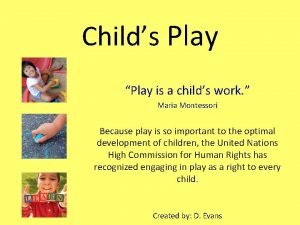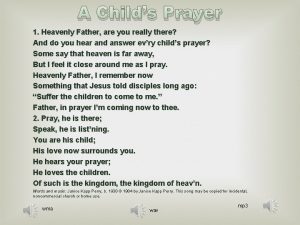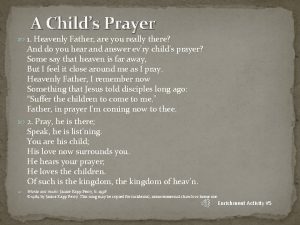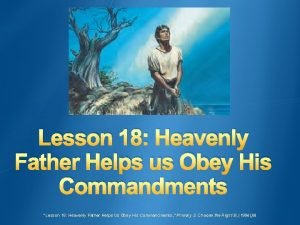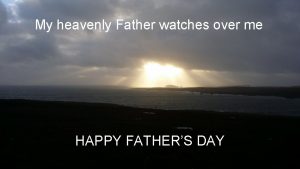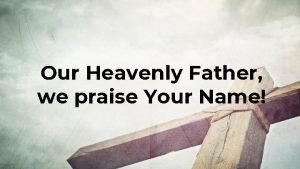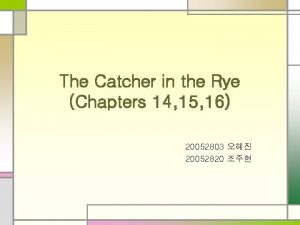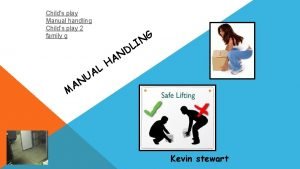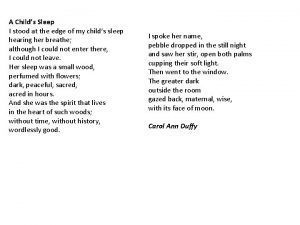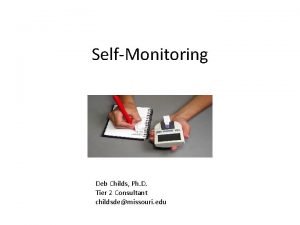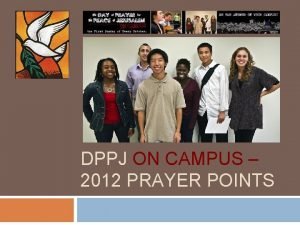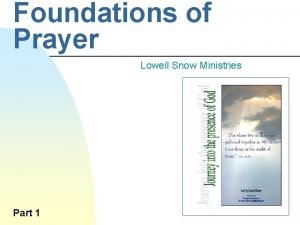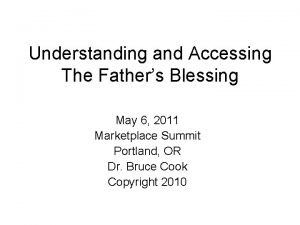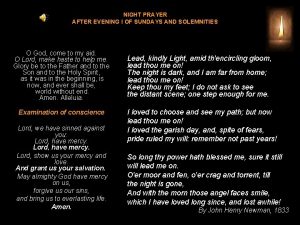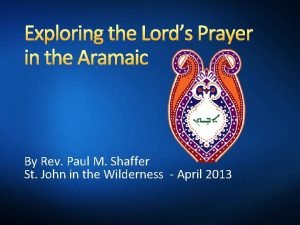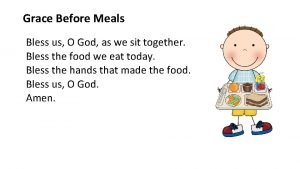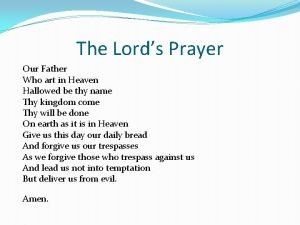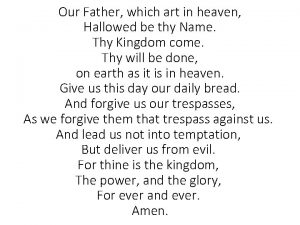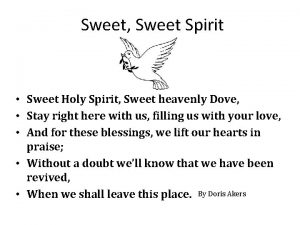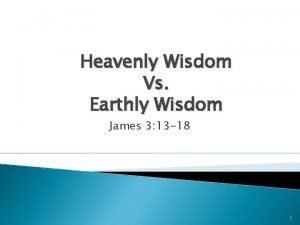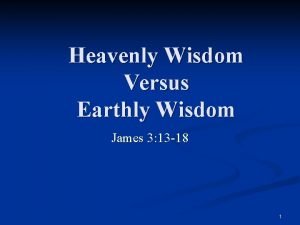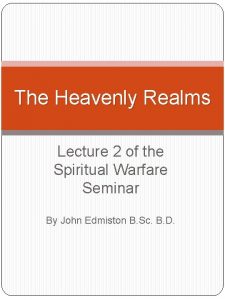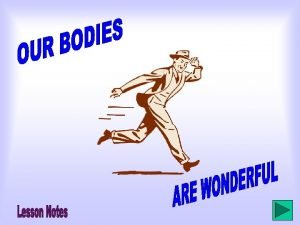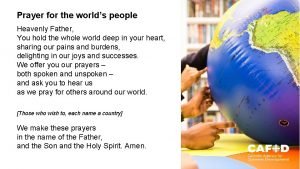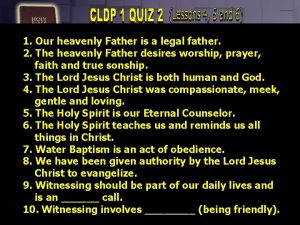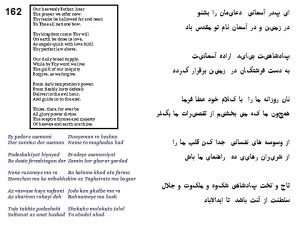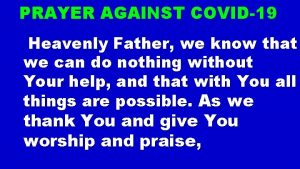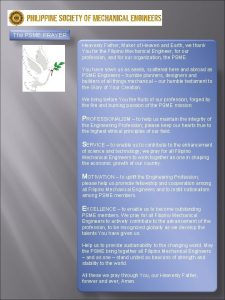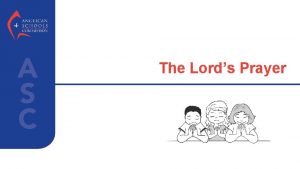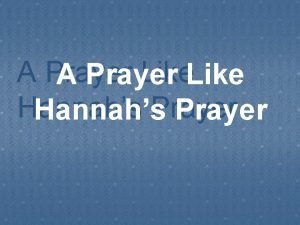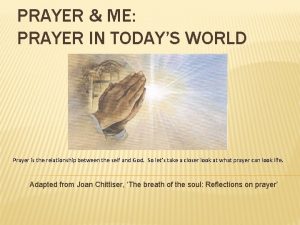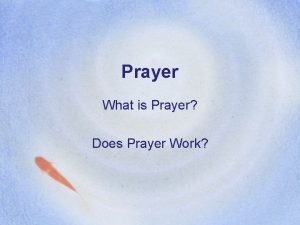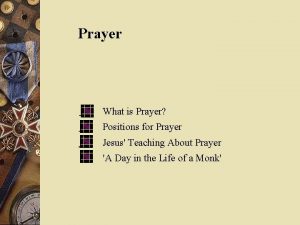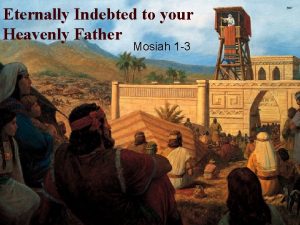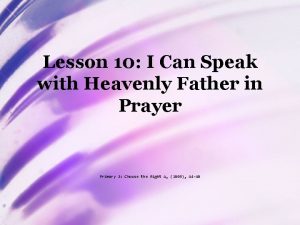A Childs Prayer 1 Heavenly Father are you














































- Slides: 46

A Child’s Prayer 1. Heavenly Father, are you really there? And do you hear and answer ev’ry child’s prayer? Some say that heaven is far away, But I feel it close around me as I pray. Heavenly Father, I remember now Something that Jesus told disciples long ago: “Suffer the children to come to me. ” Father, in prayer I’m coming now to thee. 2. Pray, he is there; Speak, he is list’ning. You are his child; His love now surrounds you. He hears your prayer; He loves the children. Of such is the kingdom, the kingdom of heav’n. Words and music: Janice Kapp Perry, b. 1938 © 1984 by Janice Kapp Perry. This song may be copied for incidental, noncommercial church or home use. Enrichment Activity #5

Job “Lesson 39: Job, ” Primary 6: Old Testament, (1996), 172

The writing portion of a pencil is graphite, which is a form of carbon. Estimate the value of the graphite in the pencil.

Scientists believe diamonds were formed millions of years ago when carbon was subjected to great heat and pressure. Diamonds are very valuable because they are the hardest natural substance, they make beautiful jewelry, and they can be used in industry for cutting and grinding.

Estimate the value of the diamond. The graphite in the pencil and the diamond are made of the same substance (carbon), yet the diamond is much more valuable. What happened to the diamond to make it so valuable?

The problems and trials we have in life can be compared to the heat and pressure that carbon must undergo to become diamonds. The “heat” and “pressure” that our trials bring us can make us strong like a diamond if we remain faithful to Heavenly Father. Today we will learn about a man who suffered many trials but never lost his faith in God.

Job was a very good man. He always did what was right. He obeyed God’s commandments. Job was also a rich man. He had many animals and servants. He had a wife and ten children. God had given him many blessings.

God knew Job was a righteous man. Satan also knew Job was righteous. Satan said Job was righteous because God had given him so many blessings. Satan said Job would not be righteous if his blessings were taken away. God said Satan could take away everything Job had. But Satan could not hurt Job. Then Satan would see that Job would still be righteous.

One day four servants came to Job. They said all of Job’s oxen and servants had been killed. They said a fire had burned all his sheep. They said his camels had been stolen.

The servants said a strong wind blew down Job’s son’s house. All Job’s children were killed. Job had nothing left.

Job was very sad. But he was not angry at God. He fell to the ground and worshiped God. He said he had nothing when he was born. God gave him everything. Now God had taken it away. Job still loved God.

God talked to Satan again. He said everything had been taken from Job. And Job was still righteous. But Satan said Job would not be righteous if he were very sick. So God said Satan could make Job sick. But Satan could not kill him.

Job became very sick. His body was covered with sores. He wished he had not been born. Job’s wife asked if he still believed God was good. Job said he did. Job said God gave people good things. God sometimes let bad things happen to them. Sometimes bad things happened to good people.

Three of Job’s friends came to see him. They were sorry for him. They told Job God punishes wicked people. They said God does not punish good people. The friends said Job must have been wicked. Bad things would not happen to him if he were righteous.

Job told his friends they were not helping him. He said he had not been wicked. He did not know why so many bad things had happened to him. Job still believed in God. Job said he might die. But he would always love God. If he did die, he would be resurrected. He would have his body again. He would see God.

Again Job’s friends told him he had been wicked. They said he may have taken things away from poor people. Or he may not have helped people when they needed help. They said God knows when people are wicked. No one can hide his sins from God. They told Job to repent. Then God would bless him.

Job told his friends he was righteous. He said God knew he was not wicked. Job said some wicked people do not have troubles. And sometimes righteous people have many troubles. Job said he did not know why God had let bad things happen to him.

Then Job heard the voice of God asked Job many questions. Where was Job when God made the world? What did Job know about the clouds, the snow, and the rain? What did Job know about the animals and the plants on the earth? God made these wonderful things.

Job answered God. Job said he did not understand these things. God told Job men cannot always understand why God does things. Men must trust God no matter what happens to them. Then Job saw God. Job had been righteous through all his troubles. Job loved God. He trusted God.

God told Job’s friends he was angry at them. The things they told Job were not right. God told them to bring animals for a sacrifice. Job prayed for his friends.

God blessed Job. He gave Job more than he had before. God gave him more animals. Job and his wife had more children. They were happy. Job lived to be a very old man. He was very righteous.

What kind of a man was Job? Let’s read Job 1: 1 How many sons and daughters did he have? Let’s read Job 1: 2 What did Satan think would happen if Job lost his wealth and family? Let’s read Job 1: 11

What happened to Job’s children and his wealth? Let’s read Job 1: 13– 19 How did Job respond to these losses? “Nor charged God foolishly” means to Let’s read Job 1: 21– 22 not blame God for trials. Why should we not blame the Lord for our trials?

When baby birds are about to hatch, they peck at the shell to free themselves. What would happen if we broke the shell away because we felt sorry for the bird? Enrichment Activity #1

The bird might die. Through pecking at the shell, birds build up enough strength so when they are free of the shell they will be strong enough to live. How can our trials make us strong so that we can return to live with Heavenly Father? Enrichment Activity #1

What did Satan think would happen if Job had to suffer physically? Let’s read Job 2: 5 What physical suffering did the Lord allow Satan to test Job with? Let’s read Job 2: 7 How did Job’s friends, family, and servants respond when Job suffered his trials? Let’s read Job 19: 13– 19

How should we respond when we see others suffering? Whom did Job continue to testify of, even after suffering so much physically and mentally? Let’s read Job 19: 25– 27 How can we be strengthened through our trials if we continue to testify of the Savior?

What sins of Job’s did his friends think were responsible for his great suffering? Let’s read Job 22: 5– 9 Sometimes suffering can be brought about by our own sins, but in many cases, as with Job, it is not. Why do trials fall upon the righteous as well as the wicked?

President Spencer W. Kimball, twelfth President of the Church, told of a lady who asked him: “ ‘Why is it that those who do the least in the building of the kingdom seem to prosper most? … We observe the Sabbath and attend our meetings; they play golf, hunt, fish, and play… Enrichment Activity #2

‘We pay much for tithing and for other Church donations; they have their entire large income to lavish upon themselves… ‘It seems to me that it does not pay to live the gospel—that the proud and the covenant-breakers are the ones who prosper. ’ ” Enrichment Activity #2

President Kimball explained that we will eventually reap what we have sown. He said, “The time of reckoning is as sure as is the passage of time and the coming of eternity. All who live shall eventually stand before the bar of God to be judged according to their works. Enrichment Activity #2

“The final assignments will constitute rewards and punishments according to the kinds of lives they lived on earth… “The books are not balanced daily, but rather at the harvest time” (The Miracle of Forgiveness [1969], pp. 301– 4). Enrichment Activity #2

What did Job resolve to do no matter what happened to him? Let’s read Job 27: 4– 5 How could this type of resolve help us deal with our daily trials? How did the Lord respond to Job’s friends after they accused him of wickedness? Let’s read Job 42: 7– 9

How did the Lord bless Job after he remained faithful through his trials? Let’s read Job 42: 10– 17 How might the Lord bless us if we remain faithful through our trials? How can your trials be a blessing to you?

Imagine a long string of yarn wrapped around the earth many times. The yarn represents eternity. Imagine a half-inch section of that yarn. This section represents the short period of time we live here on earth. Enrichment Activity #4

Let’s read together Doctrine and Covenants 121: 7– 10 This life is very short compared to eternity. If we can withstand our trials and remain faithful, we will be blessed throughout all eternity. Enrichment Activity #4

Let’s play a game! It’s called Twenty Questions! To play the game… Enrichment Activity #3

We need a volunteer to stand in front of the class and choose a slip of paper without showing it to anyone. The rest of you will take turns asking “yes” or “no” questions such as: “Is it something to eat? Is it an animal? Is it part of the body? ” The volunteer at the front responds with a stare if the answer is “yes” or a blink of the eyes if it is “no. ” You get twenty questions to try to figure out what is on the slip of paper. Enrichment Activity #3

The following is a story about a girl named Heather Erickson. She had a severe disease and had very little control of her body. The only way she could communicate was by her family asking her questions. If the answer was “yes, ” she would look directly at the speaker, and if the answer was “no, ” she would blink. Heather and her family became very good at communicating this way. Enrichment Activity #3

Heather’s special love for Jesus, in spite of her physical handicaps, was often expressed in her communications. One day her speech therapist asked Heather what her favorite song was. Heather became excited and was anxious for her therapist to know what song it was that she loved most. Enrichment Activity #3

After three days of searching and asking questions, the song was finally identified. It was “There Is Sunshine in My Soul Today” The last two lines, “And Jesus listening can hear / The songs I cannot sing, ” was Heather’s favorite part. (Hymns, no. 227). Enrichment Activity #3

Her therapist asked, “Heather, is that it? Is that what you like about the song? Is it what you want me to know? That Jesus is listening and He can hear the songs you cannot sing? ” Enrichment Activity #3

Heather lifted her head and looked her therapist straight in the eyes with excitement and yet almost relief evident on her face. The testimony had been borne. (Adapted from Bruce and Joyce Erickson, When Life Doesn’t Seem Fair [1995], pp. 49– 55. ) Enrichment Activity #3

Heather kept a positive attitude and faith in Jesus even though she couldn’t talk or have control of her body. What trials might you have to face? How can you remain faithful during trials? Enrichment Activity #3

The trials in my life have made me stronger. They have helped me remain faithful to our Heavenly Father. Even when life here on earth is difficult, in the end, it’s worth it.

Images and clipart are from lds. org, sugardoodle. net, Microsoft Office, and other websites indicating the images were in the public domain. The hymn, lesson and scripture story are from lds. org Please do not use this presentation for commercial use. Feel free to alter the presentation for use in church or home to suit personal preference. The presentation is intended to supplement, not replace, the lesson manual and scriptures. Teachers should refer to the manual, scriptures and other resources when preparing and conducting the lesson.
 Childs work childs play
Childs work childs play Antigentest åre
Antigentest åre Enos 1:15
Enos 1:15 Oh god our heavenly father prayer
Oh god our heavenly father prayer Heavenly father are you really there song
Heavenly father are you really there song You
You O heavenly king
O heavenly king Obey
Obey Heavenly father watches over me
Heavenly father watches over me We bind the spirit of infirmity
We bind the spirit of infirmity Karyn l childs
Karyn l childs Heather childs
Heather childs Catcher in the rye chapter 16-18 summary
Catcher in the rye chapter 16-18 summary Childs pugh mdcalc
Childs pugh mdcalc Megan serbian
Megan serbian Manual handling childs play
Manual handling childs play Kenna childs wikipedia
Kenna childs wikipedia Dee childs
Dee childs A child's sleep poem
A child's sleep poem Abcd of nutritional assessment
Abcd of nutritional assessment Gretchen childs
Gretchen childs Gretchen childs
Gretchen childs Deb childs
Deb childs Aaets
Aaets Prayer topics
Prayer topics Most merciful god we confess
Most merciful god we confess Prayer guide: a manual for leading prayer lowell snow
Prayer guide: a manual for leading prayer lowell snow Opening prayer prayer before meeting
Opening prayer prayer before meeting Examples of a father's blessing
Examples of a father's blessing Eritrean orthodox tewahdo prayer
Eritrean orthodox tewahdo prayer God our loving father prayer
God our loving father prayer Night prayer to god the father
Night prayer to god the father Lord's prayer aramaic
Lord's prayer aramaic Our father prayer
Our father prayer Our father prayer hail mary
Our father prayer hail mary Our father in heaven
Our father in heaven Our father
Our father The heavenly virtues
The heavenly virtues Sweet holy spirit sweet heavenly dove
Sweet holy spirit sweet heavenly dove Earthly wisdom meaning
Earthly wisdom meaning James 3 earthly wisdom
James 3 earthly wisdom 3 realms of heaven
3 realms of heaven For chase
For chase You say you love the rain
You say you love the rain Agree or disagree questions about life
Agree or disagree questions about life If you think you can you can poem
If you think you can you can poem Tell me what you eat and i shall tell you what you are
Tell me what you eat and i shall tell you what you are
